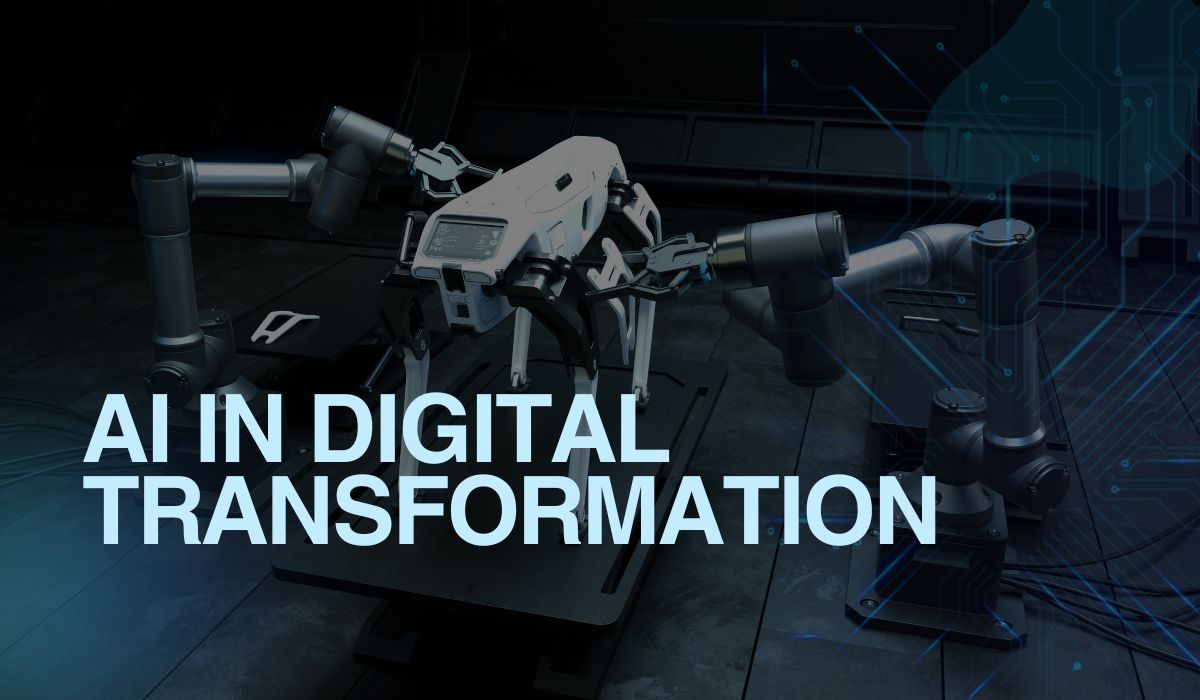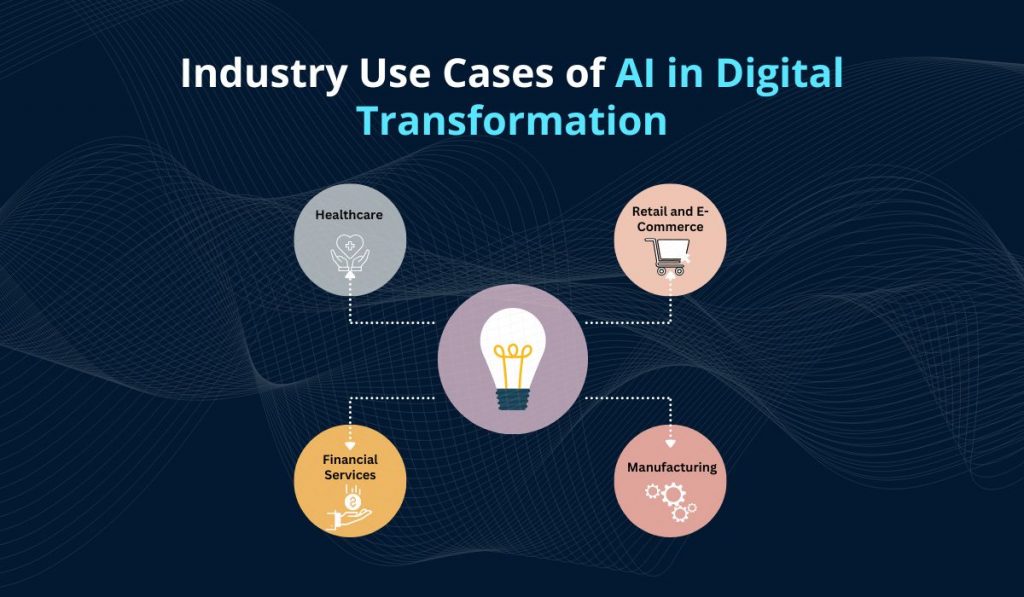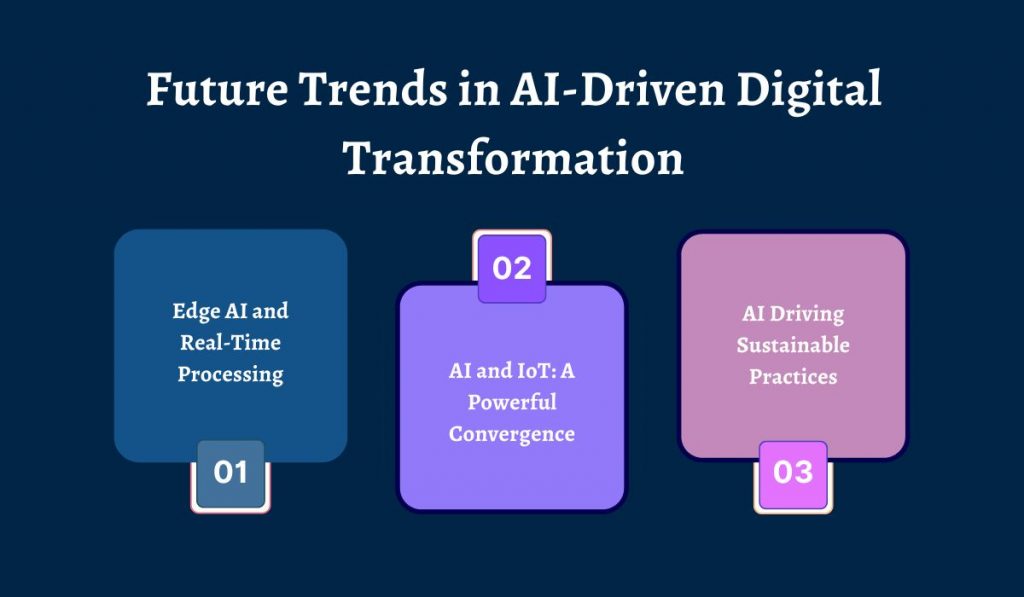
The Role of AI in Digital Transformation

The landscape of digital transformation is shifting quickly, redefining how businesses run, connect with customers, and plan for the future. At the heart of this evolution is Artificial Intelligence Services — not just a buzzword, but a powerful driver of real change. From streamlining operations to personalizing customer journeys, AI is helping organizations move faster, work smarter, and stay ahead in today’s dynamic digital age.
In this blog, we’ll break down the role of AI in digital transformation, why it matters, where it’s making the biggest impact, and how companies across industries can tap into its full potential.
What is Digital Transformation?
Digital transformation is the process of embedding digital technologies into every part of a business — changing not just how it operates internally, but also how it delivers value to customers.
At its core, it’s about boosting efficiency, staying agile, and driving innovation in an increasingly competitive landscape.
But it’s more than just adopting the latest tools. For today’s businesses, digital transformation means rethinking how they engage with customers, optimize day-to-day operations, and make smarter, data-driven decisions. Key technologies like cloud computing, big data, IoT, and artificial intelligence (AI) are at the forefront of this shift.
Together, they empower companies to access real-time insights, automate workflows, and offer personalized experiences that truly resonate with their audience.
The Importance of AI and Digital Transformation
Artificial Intelligence (AI) plays a pivotal role in shaping smarter, faster, and more responsive digital transformation strategies. It powers intelligent automation and data-driven decision-making — helping businesses move from reactive to proactive operations.
With AI technologies like machine learning, predictive analytics, and natural language processing, companies can analyze data at scale, uncover trends, and make confident decisions in real time.
Here’s how AI is making a real difference:
- Delivering personalized customer experiences through smarter, more relevant interactions
- Streamlining operations and boosting productivity with intelligent automation
- Unlocking competitive advantages by turning real-time insights into impactful actions
By embedding AI into core processes, businesses are not just improving performance — they’re redefining how they operate, innovate, and grow in a constantly evolving digital world.
Key Application of AI in Digital Transformation
AI is a driving force behind innovation in digital transformation, revolutionizing how businesses operate, serve customers, and make informed decisions. By embracing AI technologies, organizations can improve customer engagement, streamline operations, and unlock deeper insights from their data. Here are some of the most impactful ways AI is transforming industries:
Customer Experience
AI-powered tools like personalization engines, chatbots, and predictive analytics are reshaping customer engagement. By analyzing user behavior and preferences, businesses can deliver tailored experiences, recommend relevant products, and even anticipate customer needs before they arise.
Industry leaders like Amazon and Netflix have set the benchmark by using AI to create highly customized user journeys.
Operational Efficiency
AI is helping businesses run smoother and faster through intelligent automation. Solutions like Intelligent Process Automation (IPA) and Robotic Process Automation (RPA) enable companies to cut down manual tasks and boost efficiency.
In manufacturing, AI supports predictive maintenance by identifying issues before they cause downtime. In logistics, it helps optimize supply chains, lowering costs and improving delivery accuracy.
Data Analytics and Business Intelligence
AI makes it possible to process and analyze massive datasets in real time. With AI-driven predictive analytics, businesses can spot emerging trends, forecast changes in the market, and detect potential risks — helping them make smarter, faster strategic decisions and remain agile in a fast-moving landscape.
Cybersecurity
As cyber threats become more sophisticated, AI is playing a vital role in strengthening digital defenses. AI algorithms can identify unusual patterns, flag suspicious activity, and even respond to threats automatically — all in real time. This proactive approach is essential for protecting sensitive data and preventing costly breaches.
Ready to Drive Innovation with AI in Digital Transformation?
Tap into OUR AI-driven strategies that improve operational efficiency and drive meaningful growth.
AI-Enabled Technologies Powering Digital Transformation
AI-enabled technologies are shaping the future of digital transformation, helping businesses reimagine how they operate, serve customers, and innovate.
These tools provide smarter ways to process data, automate tasks, and deliver more personalized experiences — making businesses more agile and responsive in an increasingly digital world.
Here are some of the key AI-driven technologies fueling this shift:
Machine Learning (ML) and Deep Learning
At the heart of many AI applications, machine learning services and deep learning services are helping businesses predict, personalize, and protect.
From powering recommendation engines to enabling predictive maintenance and detecting fraud in real time, these technologies are critical to creating smarter, data-driven workflows across industries.
Natural Language Processing (NLP)
NLP is transforming how businesses communicate with customers. Through chatbots, virtual assistants, and sentiment analysis tools, companies can offer instant, context-aware support. By analyzing customer feedback and online conversations, businesses gain meaningful insights to fine-tune messaging and improve customer satisfaction.
Computer Vision
With the ability to interpret visual data, AI-powered computer vision is making waves in sectors like retail, healthcare, and manufacturing. Whether it’s identifying defects in production lines, enabling facial recognition for security, or powering self-checkout systems in stores — computer vision enhances both operational efficiency and user experience.
Generative AI
Generative AI is opening new doors for content creation. From writing product descriptions and designing visuals to generating code, this technology helps teams work faster and at scale. It’s especially valuable in marketing, creative services, and software development, where time-to-market and personalized engagement are key.
Industry Use Cases of AI in Digital Transformation

AI is transforming industries by boosting efficiency, improving decision-making, and creating new opportunities for value creation. Here’s how AI is making a real difference across key sectors:
Healthcare
In the healthcare sector, AI is reshaping diagnostics, personalized treatments, and patient care. By analyzing vast amounts of medical data, AI helps doctors detect diseases faster and with greater accuracy. It’s also used in monitoring patient vitals, streamlining administrative tasks, and supporting better clinical outcomes.
Retail and E-Commerce
Retailers are using AI to personalize the shopping experience, refine pricing strategies, and manage inventory more intelligently. AI helps companies like Amazon and Walmart anticipate demand, recommend products in real time, and send targeted promotions — all of which enhance customer satisfaction and drive sales.
Financial Services
In finance, AI plays a critical role in fraud detection, risk management, and customer service automation. AI-powered chatbots offer instant support, while machine learning models analyze transactions to identify suspicious activity. These tools help financial institutions stay secure and responsive in a rapidly evolving market.
Manufacturing
AI is bringing smarter automation and predictive capabilities to the manufacturing floor. By using AI for predictive maintenance, manufacturers can identify potential equipment failures before they happen — reducing costly downtime. It’s also used in quality control systems to detect defects and ensure consistent production standards.
Challenges in Implementing AI for Digital Transformation
While AI offers enormous potential, its integration into digital transformation strategies doesn’t come without hurdles. Businesses often face several challenges as they work to bring AI into their operations. Here are some of the most common:
Data Quality and Availability
AI systems are only as good as the data they’re built on. Inconsistent, incomplete, or siloed data can undermine the accuracy of insights and predictions. To get real value from AI, organizations must focus on collecting clean, reliable, and well-structured data from across their operations.
Ethical and Regulatory Concerns
As AI becomes more embedded in decision-making, questions about fairness, transparency, and compliance are rising. Bias in algorithms, lack of explainability, and evolving regulations can create roadblocks.
Businesses need to ensure their AI practices are ethical, transparent, and aligned with industry standards and legal frameworks.
Workforce Adaptation and Skill Gaps
Integrating AI often requires a shift in how people work. Many employees may not have the skills needed to work with AI tools — and that can create resistance or inefficiencies. Companies must prioritize upskilling and reskilling to prepare their workforce for AI collaboration, rather than replacement.
Cost and Infrastructure Requirements
AI implementation isn’t cheap. From high-performance computing resources to specialized software and skilled personnel, the upfront investment can be significant. Organizations must weigh these costs against the long-term gains AI can deliver in productivity, innovation, and customer satisfaction.
Future Trends in AI-Driven Digital Transformation

The future of AI in digital transformation holds tremendous promise. As AI technologies become more advanced, they’re poised to have an even greater impact on how businesses operate, make decisions, and deliver value. Here are some key trends set to shape the next wave of AI-driven transformation:
Edge AI and Real-Time Processing
Edge AI is pushing intelligence closer to where data is generated — whether in autonomous vehicles, manufacturing lines, or IoT sensors. This allows for faster decision-making with reduced latency, which is crucial in scenarios where real-time responses are critical.
AI and IoT: A Powerful Convergence
The combination of AI and IoT is unlocking new levels of automation and insight. AI helps analyze data from connected devices, enabling smarter systems that can self-monitor, adapt, and optimize performance in real time — across industries like energy, healthcare, and logistics.
AI Driving Sustainable Practices
AI is also playing a vital role in promoting sustainability. From monitoring energy consumption to reducing waste and managing carbon footprints, AI helps companies operate more responsibly while staying efficient and cost-effective.
As environmental concerns grow, AI will become an essential tool for supporting green business initiatives.
Need Expert AI Solutions for Your Digital Transformation?
Trust BigDataCentric to provide innovative AI tools that drive efficiency and improve outcomes.
Conclusion
AI has become a cornerstone of digital transformation. It empowers businesses to streamline operations, deliver personalized customer experiences, spark innovation, and stay ahead in an increasingly competitive market.
As digital transformation gains momentum, AI will remain a key driver of business evolution. Now is the time for organizations to embrace AI and begin their transformation journey. Those that take the lead will not only unlock new efficiencies and insights but also set themselves up for long-term growth and resilience in the digital age.
FAQs
-
How does AI in digital transformation differ from traditional AI applications?
In digital transformation, AI is integrated holistically across departments to optimize various aspects of business operations. Traditional AI applications may focus narrowly on solving specific tasks or challenges.
-
How does AI help organizations scale their digital transformation efforts?
AI enables businesses to scale by automating repetitive tasks, processing large volumes of data, and offering real-time insights. This reduces bottlenecks, improves operational efficiency, and frees up resources for growth initiatives.
-
How does AI impact data privacy and security in a digital business transformation?
AI can enhance data security by identifying potential threats, automating compliance checks, and providing real-time risk analysis. However, businesses must ensure that AI applications comply with privacy laws and handle sensitive data responsibly.
-
What role do cloud platforms play in AI-powered digital transformation?
Cloud platforms provide the infrastructure to scale AI applications, offer processing power, and enable data storage, which allows businesses to deploy AI solutions cost-effectively and efficiently.
-
Can AI be used to predict customer behavior in digital transformation?
Yes, AI can analyze past customer interactions, preferences, and demographic data to predict future behaviors, allowing businesses to personalize marketing campaigns, product offerings, and customer service proactively.
-
How can businesses ensure that their AI systems are adaptable to changing market conditions?
To ensure adaptability, businesses should implement flexible AI systems that can be retrained with new data, regularly evaluate AI models, and invest in platforms that can scale and evolve with the business as market conditions change.

About Author
Jayanti Katariya is the CEO of BigDataCentric, a leading provider of AI, machine learning, data science, and business intelligence solutions. With 18+ years of industry experience, he has been at the forefront of helping businesses unlock growth through data-driven insights. Passionate about developing creative technology solutions from a young age, he pursued an engineering degree to further this interest. Under his leadership, BigDataCentric delivers tailored AI and analytics solutions to optimize business processes. His expertise drives innovation in data science, enabling organizations to make smarter, data-backed decisions.
Table of Contents
Toggle